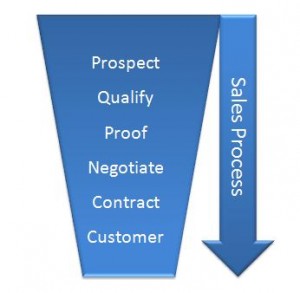Why you should stop sneering at sales and learn something.
 You are going to have to excuse me – but I am about to rant.
You are going to have to excuse me – but I am about to rant.
Rant on.
I do not refer to myself a ‘sales person’. But many people do. In fact, I have no direct sales responsibility and I bridle when they say it. They say “but you’re in sales…” And I correct them, “I’m an executive and one of the disciplines of running a business is – a vital discipline – is sales.”
I as a student of business with an open mind understand that ‘sales’ – and I shudder as I say it because of all the baggage that the word carries – ‘Sales’ is the most impactful science and discipline you can master. Not only for your company but also for your personal success.
But I know you; you are not going to let petty, moronic biases keep you from learning this discipline and using it to your advantage. Let’s face it, the majority of the population maintains this nonsensical, insulting view of Sales. You, by learning its secrets will outpace and steal a march on the feeble minded majority.
And I know you; you have that picture in your head of some redneck in a plaid suit trying to sell a used car. That, my friends, is a cultural bias. If that is your built in bias, then your inner game is broken and you need to fix it.
You can tell this makes me mad. Why? Because it is bad thinking. It is ignorant thinking.
Bad thinking. Small thinking. That’s the along the same lines as racist or sexist or religious bias. You need to shake bad and biased thinking in order to harness the power of professional, of business , of sales thinking.
Really my friends. You need to move beyond your comic bias and use these disciplines, understand these disciplines, at least be aware of the power of these disciplines.
Why do you think those successful sales people are always so smug and smiling? Because they know you don’t have the balls to cross the bias barrier and understand their skill set.
Ok – rant off – Let me be rational.
I first learned about the science of sales when I realized that by learning and applying these secrets I could make more money with less work. And, I call them ‘secrets’ because they are secrets to those who are too biased to go out and look for them.
Just like I trained myself to give speeches and presentations – even though I was terrified of standing up in front of a crowd – I learned the methods of sales because it scared me.
Why? Because in life and in business you look for points of leverage, where the smallest amount of focused effort can move the largest amount of capital. Leverage. That’s what study public speaking and sales have in common. Those can be areas of great leverage for a business person in their career.
I define sales as the mutual exchange of value. I give you something of value and you trade me something of value. We both get what we want. That is what makes our society work.
What is the science of sales? Well, as usual this is a big question and I’m just going to peel off one piece of it to make a point. I’m going to do a number of these ‘Science of Sales’ pieces to get you an overview of what’s going on in the sales process.
You may say, “But, Chris, I’m never involved in a sales process!” Oh really? So…you’ve never bought anything? Oh… (Now the light bulb goes off). That’s right. You are continuously involved in sales processes you just don’t know it and you don’t have the tools to be successful at it.
The first thing I want to share is the process itself. You may hear people referring to the ‘Sales Cycle’ or the ‘Sales Campaign’. Believe it or not most companies have a standard sales process. This process starts with the marketplace and ends with a purchase and use of your product.
This process has a number of discrete steps. The goal of the sales process is to move you in from the market, through the process and out the other side as a paying customer. The important aspects of this sales process are:
– Finding enough potential buyers to start the process (Marketing volume)
– Getting enough of them out the back side as actual paying customers (The close rate or effectiveness)
– The speed that you can get them though the process (sales velocity or sales cycle length)
– The revenue and cost that you get with each transaction (profit margin)
Many more people will start the process then will come out the other side as a paying customer. This makes the front of the sales process wider than the exit point. This is why it is called a ‘Sales Funnel’.
The goal of any sales organization is to get more prospects in the front, get them out the back faster, at a high win rate and at a low cost and high price to create margin.
Marketing activity is what companies use to herd prospects into the front end of the funnel. Sort of like Border Collies herding sheep into the barn. These include all the billboards and TV commercials, etc. For direct sales they include networking, white papers, webinars, cold calling, etc.
The first step in the sales process starts with a ‘Suspect’. We don’t know if that person showed up in our funnel because they are willing, able or desire to buy something. Maybe they just got lost or bored.
They way we turn a ‘Suspect’ into a ‘Prospect’ is through ‘Qualification’. The ‘Qualification’ process will be different for different businesses but we are asking questions to see if you have the ability to buy, a reason to buy, a timeframe to buy(urgency) and we are even asking questions to determine if you are someone we want to have as a customer.
Why do you care? Because, now you know that when that nice person asks you “What were you looking to spend today?” He or She is trying to determine whether you are a prospect or a ‘tire kicker’.
The next step in the process is typically some form of proof. If you are indeed a prospect we may ask you some more questions around how you would be using the product. This is known as ‘Discovery’. We do discovery so we can determine which flavor or application of our product fits you best.
Discovery questions would be; “Is it a north or south facing yard?” or “How much sun would you say it gets?” Or “How much traffic is there in this area?” You see, we know so much about our products we have to skinny them down to what’s important to you.
Then there may be some sort of Demonstration. This may be as simple as handing you the product to hold or as complex as doing some example work for you. This is how we ‘Prove’ that the product will meet your needs. We may also have you talk to our happy customers. This is known as a ‘Reference’.
If everything seems to be a fit, at this point we are going to ask you for your business. This is called ‘Closing’ by hard core sales folks, but could be as simple as you deciding to buy.
At this point you may bring up competitive offerings and a negotiation commences. If we agree on terms and price then we may execute a contract. When you sign that contract we have a sale. When you pay your bill we have a revenue event.
If I am a sales person working on commission I get paid either on the sale or the revenue event.
 If you want to have some fun search Google images for Sales Funnel.
If you want to have some fun search Google images for Sales Funnel.
There are hundreds of variations of sales process. I have seen processes with 15 discrete steps or more. The more complex the product and the application of that product the more important having a discrete sales process is. Why? Because the company needs revenue events to pay the bills and keep the lights on.
The disconnect is that sales are not always predictable, but your monthly bills are very predictable. This makes the owners of the company crazy.
“How much are you going to sell?”
“I don’t know.”
You can’t run a business like that. Now you know why the sales department has so much power in the company – they control the flow of money which is the food and water of the corporate body.
And, that is why they follow a structured process, because it allows sales to be more predictable. If I know that I get one paying customer for every ten prospects, I know I have to find ten more prospects or do a better job at getting the prospects I have to the finish line. See? Once you have process it becomes a science. It becomes predictable and more importantly it becomes learnable and manageable.
Why do you care?
First, by understanding the sales process you can realize when you are on the receiving end of the process and manage it to your advantage.
Second, realize that YOU are a product that is being sold every day and you can use a sales process to make THAT outcome predictable.
Third, there is nothing magical about sales. Once you understand the process you can take the fear out of it and move yourself closer to the money. The closer you get to the source of the money the more money will end up in your family’s pockets.
Fourth, realize that there is nothing inherently evil about sales as a process. It’s how you use that process. You can use it too – and you can use it for good.
Fifth, the sales team has the ultimate leverage on the rest of the company. If they stop selling everyone loses. It is always in your best career interest to seek out points of leverage and align yourself with them.
Finally, you should try to get some experience in direct sales if you can. It’s a powerful, portable skill set and the only thing keeping you from learning it is your own petty biases.

Thanks for this insight into the sales process. This is a bit of a tangent (probably not surprising) but the summer after high school I was going to save the souls of the world and spent 10 weeks as a 17 year old “summer missionary” literally knocking on doors and asking people if they had been “saved.” Predictably, I secretly hoped they were not home because even in 1982 people weren’t too thrilled with strangers knocking on their doors trying to save them from sin with pre-packaged speeches. Fast forward a few years (five or so) and I realized that I didn’t really have a deep belief in the speech I was giving in the first place. For that reason I would also add be at least in serious like and hopefully in love with your product in the first place.